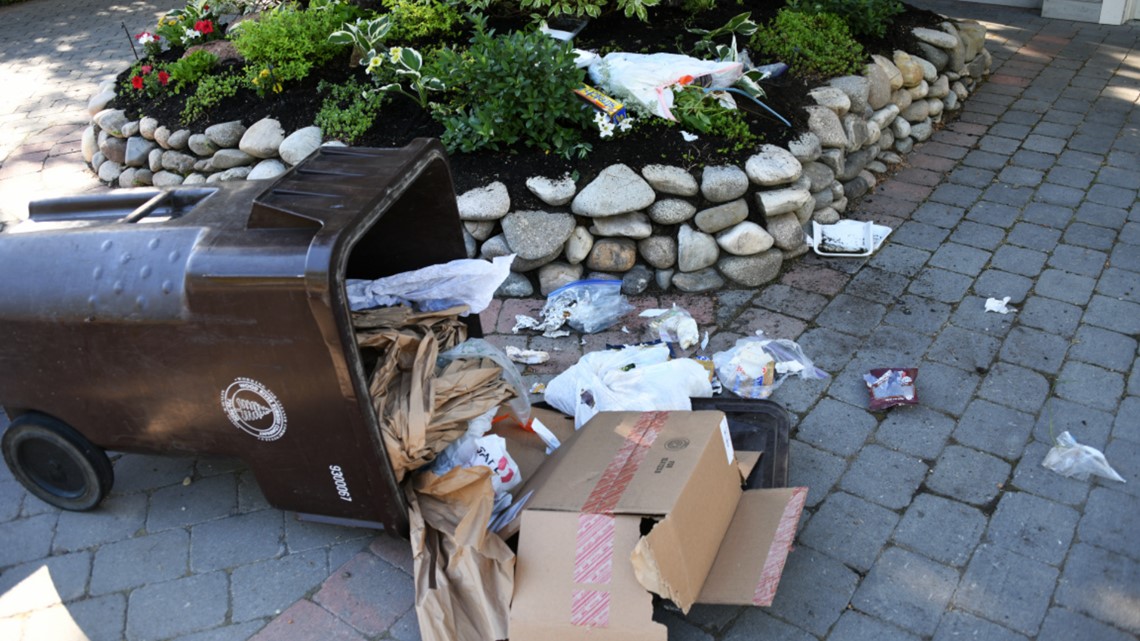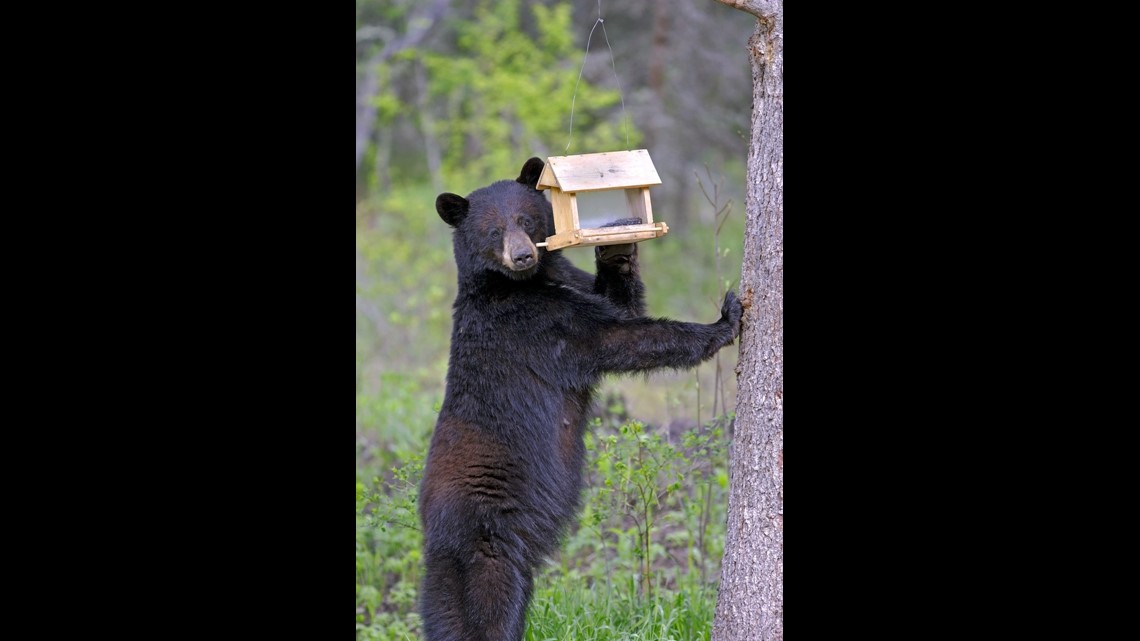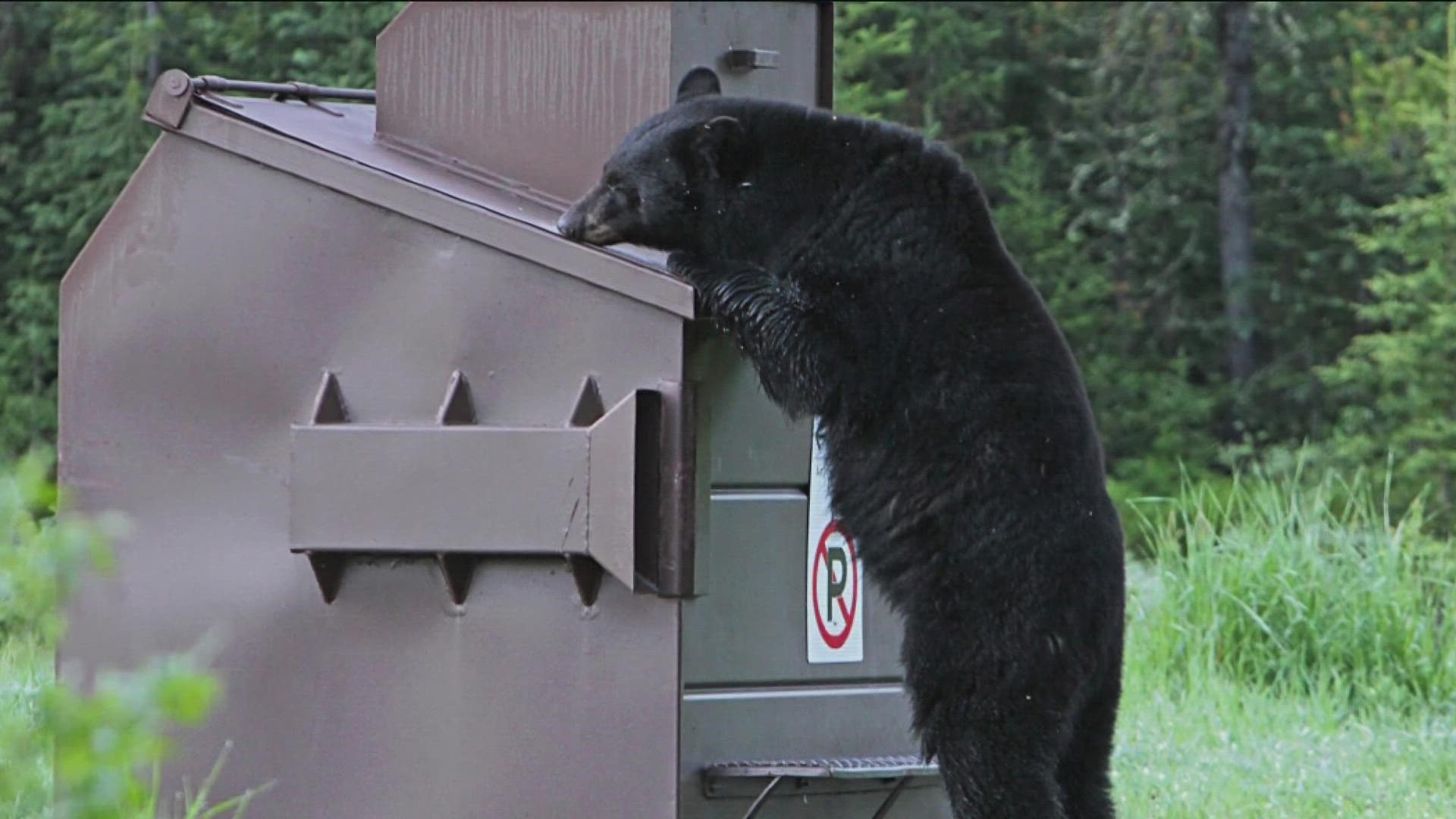BOISE, Idaho — After an increase in bear reports, the Idaho Department of Fish and Game (IDFG) is reminding residents about tips that can help them avoid a bear encounter.
Staff at the Southwest Regional Fish and Game Office reported multiple calls about black bears breaking into homes near Crouch, with most encounters happening around the Castle Mountain and Terrace Lakes neighborhoods.
"This bear in Crouch has actually broken into area residences seeking and obtaining food rewards, which is obviously concerning behavior," Regional Wildlife Manager Ryan Walrath said. "We are currently working to trap this animal, but want area residents to be aware that there are measures they can take to help prevent 'bad' bear behavior from escalating to this point, or from happening in the first place."
IDFG recommends residents store their food and garbage properly, which can help limit the number of bears frequenting the area. As fall approaches, black bear populations are getting prepared for the upcoming den season by seeking out food to pack on weight prior to hibernating.
This timeframe, beginning mid-summer and lasting into early fall, is also the time of year that IDFG receives most of its reports regarding human and black bear conflicts in Idaho.
In a majority of these cases, the conflicts stem from human behavior more than the bears' behavior. Bears tend to only go out of their way when it involves an easy meal.
Black bears can pack on as much as 30 pounds per week, about 4-5 inches of body fat, in the time prior to denning. In order to accomplish enough weight gain, bears consume around 20,000 calories per day, which means they need to constantly be on the hunt for food high in protein and fat.
In rural areas, like Crouch, most towns sit on the wildland urban interface, which is situated right in the middle of bear habitat; it is for that reason that bears wander into town, seeking the smell of food. Typically, the only food they find tends to come from human sources, like garbage, pet food or bird feeders, which are all calorically dense.


"In the vast majority of cases, it's not a bear problem – it's a people problem. Bears are being provided with an easy meal and becoming habituated to humans, and that's when we see unwanted and unsafe bear behaviors escalate," Walrath said.
Stumbling upon food provided by people is bad for both bears and the residents living in those neighborhoods. Most often, it leads to the bear being killed because they become more comfortable around people and there is nothing to deter them from frequenting locations with a regular food source.
"They can grow impatient or even pushy in their search for food and may not leave when you try to scare them away, because the promise of food overcomes their fear of people," Walrath said. "And that is a dangerous situation."
Once it becomes apparent that a bear has become habituated to an area, or has lost its fear of humans, biologists and conservation officers will trap and kill the bear. According to conservation officers, habituated bears are unable to be relocated because research shows "they will quickly travel long distances to seek out human foods in their new locations."
"We cannot responsibly move a habituated bear knowing it will likely visit the nearest campground or neighborhood and cause a potential safety hazard," said Regional Supervisor Josh Royse. "We use the adage, 'A fed bear is a dead bear,' because whenever a bear becomes habituated, that is almost always the only option. It's not a part of the job that any of us enjoy, but it is almost always the only appropriate course of action in the interest of public safety."
Ensuring bears stay wild and away from homes takes effort and cooperation from the public and state agencies.
The best way to keep Idaho bears wild is to prevent access to human food sources in neighborhoods and homes.
Unsecured human food sources, like residential garbage, bird feeders, dog food, chicken coops, or even fruit trees, can draw bears into an area where they come into contact with humans; this situation rarely ever ends well for the bears, and can be unsafe for anyone involved.
"This is why we put so much emphasis on preventing bears from getting food rewards from humans. Once the bear becomes habituated, which can happen after getting into unsecured garbage can only a handful of times, almost without fail, our only option is to euthanize the bear," Royse said. "We absolutely don't want to see that outcome. For this reason, you continually see us implore the public to do everything they can to not contribute to the problem."


Following the steps below helps protect both you and the bears:
- Remove bird feeders between April and mid-November.
- Feed pets inside.
- Get a bear-resistant trash can and use it only as directed; do not tamper with latches, prop them open, or overfill them. If you do not have a bear-resistant can, or if there is too much trash to fit in the can, keep it in a garage until the morning of pickup.
- Do not keep coolers, refrigerators, or freezers outside.
- If a bear has already visited your place and found food, take the above steps right away. The bear will likely pay you a couple more visits, but if it finds no food, it will eventually move on.
Residents living in Boise County can report bear problems to staff at the Nampa Fish and Game location at 208-465-8465, and they will monitor the situation.
Watch more Local News:
See the latest news from around the Treasure Valley and the Gem State in our YouTube playlist:

